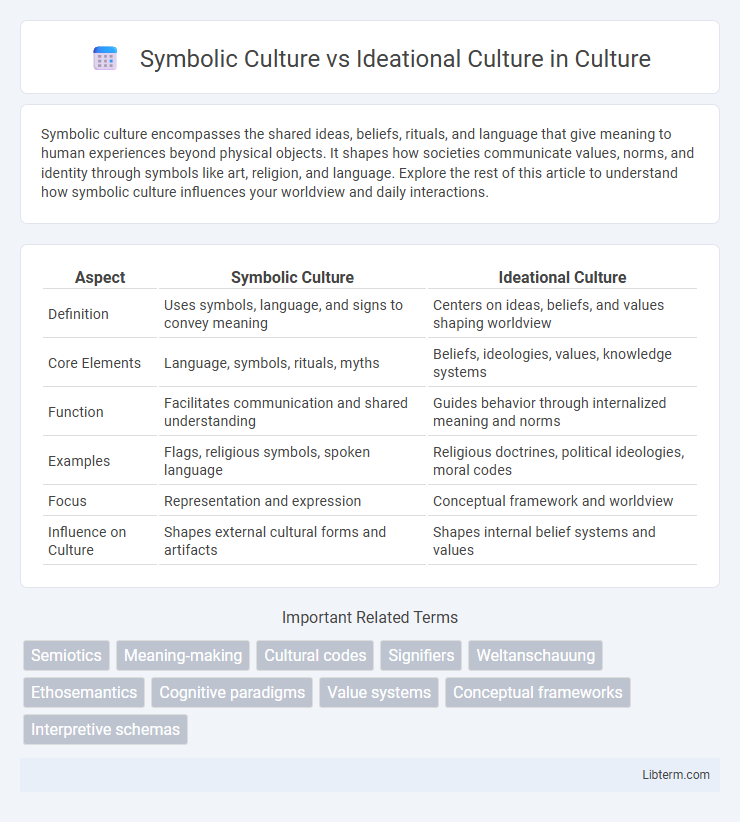Symbolic culture encompasses the shared ideas, beliefs, rituals, and language that give meaning to human experiences beyond physical objects. It shapes how societies communicate values, norms, and identity through symbols like art, religion, and language. Explore the rest of this article to understand how symbolic culture influences your worldview and daily interactions.
Table of Comparison
| Aspect | Symbolic Culture | Ideational Culture |
|---|---|---|
| Definition | Uses symbols, language, and signs to convey meaning | Centers on ideas, beliefs, and values shaping worldview |
| Core Elements | Language, symbols, rituals, myths | Beliefs, ideologies, values, knowledge systems |
| Function | Facilitates communication and shared understanding | Guides behavior through internalized meaning and norms |
| Examples | Flags, religious symbols, spoken language | Religious doctrines, political ideologies, moral codes |
| Focus | Representation and expression | Conceptual framework and worldview |
| Influence on Culture | Shapes external cultural forms and artifacts | Shapes internal belief systems and values |
Defining Symbolic Culture
Symbolic culture consists of the shared systems of symbols, language, rituals, and values that shape collective meaning and social behavior within a society. It serves as the foundation for communication and cultural transmission, enabling individuals to interpret and convey complex ideas through symbols. Defining symbolic culture involves recognizing it as the abstract, non-material aspect of culture that governs how people understand and interact with their social world.
Understanding Ideational Culture
Ideational culture centers on shared beliefs, values, and meanings that shape a community's worldview and guide social behavior. It emphasizes intangible elements such as spirituality, myths, and moral frameworks that influence identity and collective consciousness. Understanding ideational culture requires examining how symbolic meanings and collective ideologies inform rituals, traditions, and social norms within a society.
Key Differences Between Symbolic and Ideational Culture
Symbolic culture centers on tangible symbols such as language, rituals, and artifacts that convey meaning within a society, whereas ideational culture refers to the underlying beliefs, values, and ideas shaping those symbols. Key differences include the emphasis on external expressions in symbolic culture versus internal cognitive frameworks in ideational culture, with symbolic culture manifesting socially observable behaviors and ideational culture influencing worldview and decision-making. Understanding this distinction is crucial for analyzing cultural dynamics and how societies communicate and internalize meaning.
Historical Roots of Both Cultural Concepts
Symbolic culture emerged from the work of Clifford Geertz, who emphasized the role of symbols and meanings in shaping human behavior, highlighting culture as a system of inherited conceptions expressed through symbols. Ideational culture, rooted in the ideas of anthropologists like Alfred Kroeber and scholars of the cultural turn, centers on the cognitive and ideational frameworks that guide social practices and worldviews. Both concepts trace back to early 20th-century anthropology, reflecting different emphases on culture as symbolic systems versus mental constructs influencing societal organization.
Symbolism in Everyday Practices
Symbolic culture encompasses the use of symbols, language, and rituals that convey meaning and shape social interactions, serving as a framework for understanding shared beliefs and values in everyday practices. In contrast, ideational culture centers on abstract ideas, ideologies, and cognitive frameworks guiding behavior and thought processes. Symbolism in everyday practices manifests through rituals, gestures, dress codes, and language patterns that transmit cultural norms and foster group identity.
The Role of Ideas and Beliefs in Ideational Culture
Ideational culture places significant emphasis on the role of ideas and beliefs as foundational elements shaping social behavior and collective identity. Unlike symbolic culture, which centers on symbols and their meanings, ideational culture prioritizes shared worldviews and value systems that guide decision-making and influence societal institutions. These deeply held convictions function as cognitive frameworks that sustain cultural continuity and adaptation over time.
How Symbolic Culture Shapes Social Identity
Symbolic culture, encompassing language, rituals, and symbols, profoundly shapes social identity by providing shared meanings that unite members of a group through common values and beliefs. This cultural framework enables individuals to define their roles, establish social norms, and express group affiliation, reinforcing collective identity and social cohesion. Unlike ideational culture, which centers on abstract ideas and knowledge systems, symbolic culture directly influences everyday interactions and socialization processes that construct personal and group identities.
Impact of Ideational Culture on Social Norms
Ideational culture profoundly shapes social norms by embedding collective values, beliefs, and worldviews into everyday behavior, guiding individuals' perceptions of right and wrong. Unlike symbolic culture, which centers on tangible symbols and rituals, ideational culture influences the intangible cognitive frameworks that define societal expectations and moral standards. This internalized cultural cognition drives conformity and social cohesion, reinforcing norms through shared meaning rather than explicit articulation.
Intersections and Overlaps of Symbolic and Ideational Culture
Symbolic culture and ideational culture intersect prominently in their reliance on shared meanings and collective representations that shape social realities and guide behavior. Both cultural forms utilize symbols, language, and rituals to convey values, beliefs, and norms, creating overlapping frameworks that influence identity, communication, and social cohesion. This confluence highlights the integral role of cognitive and interpretive processes in embedding cultural significance within groups and societies.
Implications for Modern Societies
Symbolic culture, centered on language, rituals, and symbols, shapes social norms and collective identity, while ideational culture emphasizes ideas, beliefs, and values influencing innovation and governance models. Modern societies experiencing rapid globalization face challenges integrating symbolic culture, which preserves tradition, with ideational culture that drives modernization and policy change. Balancing these cultural dimensions is critical for fostering social cohesion, enhancing cross-cultural communication, and encouraging adaptive institutional frameworks in diverse, dynamic environments.
Symbolic Culture Infographic

 libterm.com
libterm.com